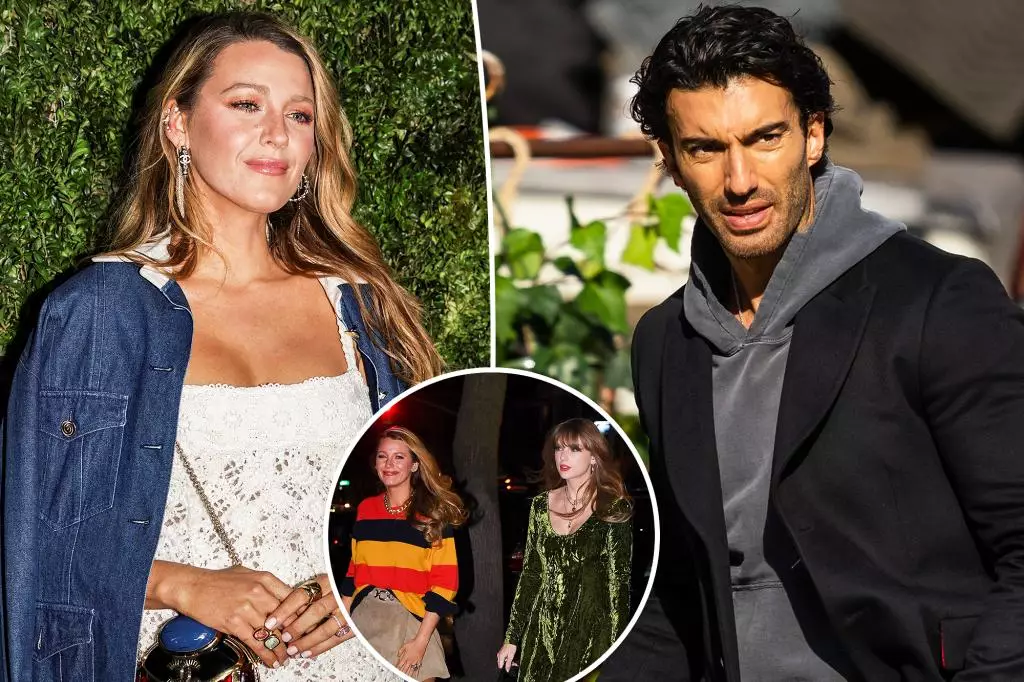In the glitzy world of Hollywood, where personal and professional lives often intertwine, legal dramas can become as captivating as the films themselves. This was exemplified in the ongoing feud between Blake Lively and Justin Baldoni. The actress, best known for her roles in films such as “The Age of Adeline,” has recently moved to block Baldoni from accessing her private correspondence with pop superstar Taylor Swift amid their contentious legal battle. The case, presided over by New York judge Lewis J. Liman, has not only shed light on the intricacies of celebrity disputes but also highlighted the lengths to which individuals in the entertainment industry will go to protect their privacy.
The crux of the situation escalated when Lively’s legal team filed a motion for a “protective order,” arguing that Baldoni’s requests for her messages with Swift are not relevant to the lawsuit at hand. This motion sheds light on the nature of Baldoni’s investigation into Lively’s interactions with the pop singer, revealing it to be a strategic maneuver to leverage public sentiment and concern involving Swift’s influential fanbase. It is an unsettling reminder that in the courtroom, friendships and celebrity status can become bargaining chips in a much larger game.
The Strategic Use of Celebrity Connections
Lively’s allegations suggest a troubling trend in the industry: the weaponization of celebrity relationships in legal matters. The charisma and public personas of artists like Swift can often overshadow the isolated grievances at the heart of a dispute, compelling their names into the spotlight for salacious headlines instead of focusing on legitimate claims. This tactic can blur the lines between public relations strategy and justice, igniting a firestorm of media attention that often detracts from the genuine issues at play.
Lively’s representatives recently articulated their disdain for this approach, stating that Baldoni’s pursuit of Swift’s communications appeared to be indicative of a larger public relations strategy rather than a serious quest for evidence. This raises ethical questions: When does the pursuit of legal recourse become a malicious endeavor to rally public opinion against an opponent? In an age where the line between celebrity and the courtroom has practically evaporated, Lively’s case serves as a critical case study on the interaction of fame and litigation.
Legal Implications of Celebrity Interventions
The legal wrangling has not been without its back-and-forth, as Baldoni’s team had previously attempted to summon Swift into the drama, asserting her presence in crucial meetings surrounding Lively and Baldoni’s prior collaborations. However, after what appeared to have been a thorough exploration of her testimony, Baldoni’s legal team rescinded their subpoena, ostensibly satisfied with the information gathered during the investigation.
The recanting of the subpoena and subsequent motion suggest that ultimately, the access to Swift’s dialogue may have been more about creating a public narrative than about pursuing a legitimate legal strategy. This reflects a profound pivot in how public figures navigate legal claims, utilizing the echo chamber of social media to amplify their positions rather than deeply engage with the substance of their claims.
The Court’s Role in Celebrity Legalities
Recent developments in court have further complicated the landscape, as a New York judge dismissed Baldoni’s countersuit against Lively and her husband, Ryan Reynolds, along with a linked libel case against the New York Times. This underscores not only a critical win for Lively and Reynolds but also raises significant questions regarding the viability of celebrity-borne lawsuits in the face of mounting scrutiny. The court’s caution in dismissing Baldoni’s claims hints at a growing awareness of the volatility and sensationalism that can proliferate when high-profile names are involved in legal disputes.
Moving forward, Baldoni’s legal team has until a specified date to amend their claims. The impending trial slated for March 2026 looms as a significant date on the calendar. It presents an opportunity not only for Lively and Baldoni to address their grievances substantively but also for the industry at large to reflect on how celebrity culture intertwines intricately with legal systems.
The Broader Implications for Celebrity Culture
Ultimately, the ongoing legal skirmishes raise vital reflections on Hollywood’s culture and the broader implications it holds for public figures. At the confluence of fame, legal rights, and personal relationships, cases like these beckon a re-examination of how celebrities navigate conflicts when privacy becomes a commodity. Actors and creators may need to stay vigilant, recognizing that their personal life choices may unintentionally entangle them in battles that not only test the limits of their legal rights but also the public’s perception of their integrity.
As the saga of Blake Lively and Justin Baldoni continues to unfold, the public will undoubtedly watch with bated breath, grappling with the intricate dance of celebrity and legal propriety. In the final analysis, it remains to be seen how this dramatic tale from Tinseltown will resolve, but it stands undeniably as a stark reminder of both the allure and the potential pitfalls of being part of an entertainment-centric universe.
